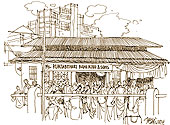 |
Once upon a time, Kunja Thakur was a household name in Guwahati. Hailing from a very ordinary family of Madhyapara village in Vikrampur, Dhaka, he became an institution during his lifetime. By sheer dint of hard labour, business skills and vision, he built up a business empire in the later part of the nineteenth century in Lower Assam centering Guwahati.
Kunja Behari Banerjee, later popular as Kunja Thakur, came to Assam, in all probability, in the early 1870s in search of his maternal uncle. Aditya Chatterjee, his uncle, ran a small grocery shop near the riverside at Fancy Bazar. When young Kunja met his Aditya mama in Guwahati, the latter insisted that Kunja look after the shop for sometime so that he could visit his home in Dhaka. Kunja agreed, never foreseeing the fact that his uncle would never return.
When years of wait for his uncle?s return went by, the youth decided to go back to his ancestral home, abandoning the business. However, Srimanta Sen, a leading citizen of the town at that time, persuaded him to stay back in the land of Goddess Kamakhya. Little did young Kunja realise then that Lady Luck was about to smile at him in Guwahati.
By the 1880s, Kunja Thakur had taken up the business seriously. Gradually he expanded the grocery business to transform the little shop to the most exclusive retail shop in town. Starting from ingredients for ayurvedic medicines like boira, silikha, amlakhi to honey, puja materials from camphor to almanac, and groceries from cummin for the Indians to custard for the Europeans ? it was all available at Kunja Thakur?s shop.
Through extraordinary vision Kunja Thakur developed his business beyond grocery. When the Collector of Guwahati started issuing trade licenses of opium for Lower Assam, (as the free trade of opium was prohibited by the British government) Kunja Thakur put in a bid and succeeded in getting a permit for retail distribution of opium.
That really turned the wheel of fortune for Kunjababu. He became the goladar (stockist) of opium and within a short time established a chain of about 32 shops in different parts of Lower Assam. These were mainly retail outlets of opium.
While the common men, particularly villagers, were the main clients of Kunjababu?s opium, the grocery shop at Fancy Bazar attracted the middle class and the elite. Kunjababu?s shop, popularly known as Kunja Thakurar Dukan even today, became a trademark of good quality. A red khata, maintained in the shop till a decade back, contained the list of monthly clients among whom were included Gopinath Bardoloi, Tarun Ram Phukan, Kali Charan Sen, Nao Gosain Kumudeswar Goswami, Guru Prasad Baruah, and many others.
Kunja Thakur also became the food grains supplier to the Assam Bengal Railways and Trading Company workers when this company was installing railway lines in different parts of Assam.
Kunjababu married twice ? first Jogamaya Devi and then Manomohini Devi. He had three sons, Kedareshwar, Bhubaneshwar and Bireshwar and a daughter from his two wives. Their offsprings have later succeeded in different walks of life.
Kunja Thakur amassed a huge fortune and accumulated hundreds of acres of landed property during his lifetime. He was also a philanthropist. The crematorium at Bhutnath was established on a plot of land donated by Kunja Thakur. He made generous donations towards the establishment of Gauhati Harisabha, Kamrup Academy, Bengali School, Fancy Bazar Puja Samiti and other social institutions.
Interestingly, though Kunjababu could neither speak or understand English, he was on quite friendly terms with many British officers in the town. The lingua franca was Hindi. Kunja Behari Banerjee?s name is mentioned in the personal diary of A.H.W. Bentinck, the erstwhile deputy commissioner of Kamrup, who frequently visited his shop.
There was a time when street vendors at Fancy Bazar would stand up in reverence every time Kunja Thakur?s phaeton passed by. Towards the end of his life Kunjababu used to travel in a Morris 8 car bearing with a number plate ASK 129.
This enterprising merchant also had an utensil shop at Maulavi Bazar in Dhaka. While on a visit to his Dhaka shop in March 1941, he expired. He was 75. Though Kunja Thakur died in Dhaka, his legacy still remains in Guwahati.
K.B. Banerjee and Sons, located at the heart of Fancy Bazar, not only survived three major earthquakes and two major fires, the shop still serves everything from ayurvedic ingredients to groceries to the obscurest of items required for any puja.
Till now the traditional shop?s sales are entered in the book of accounts The only thing missing in the shop today, however, is ganjaor afim (opium) of which Kunja Thakur was the exclusive dealer during the British days.
Dipankar Banerjee











